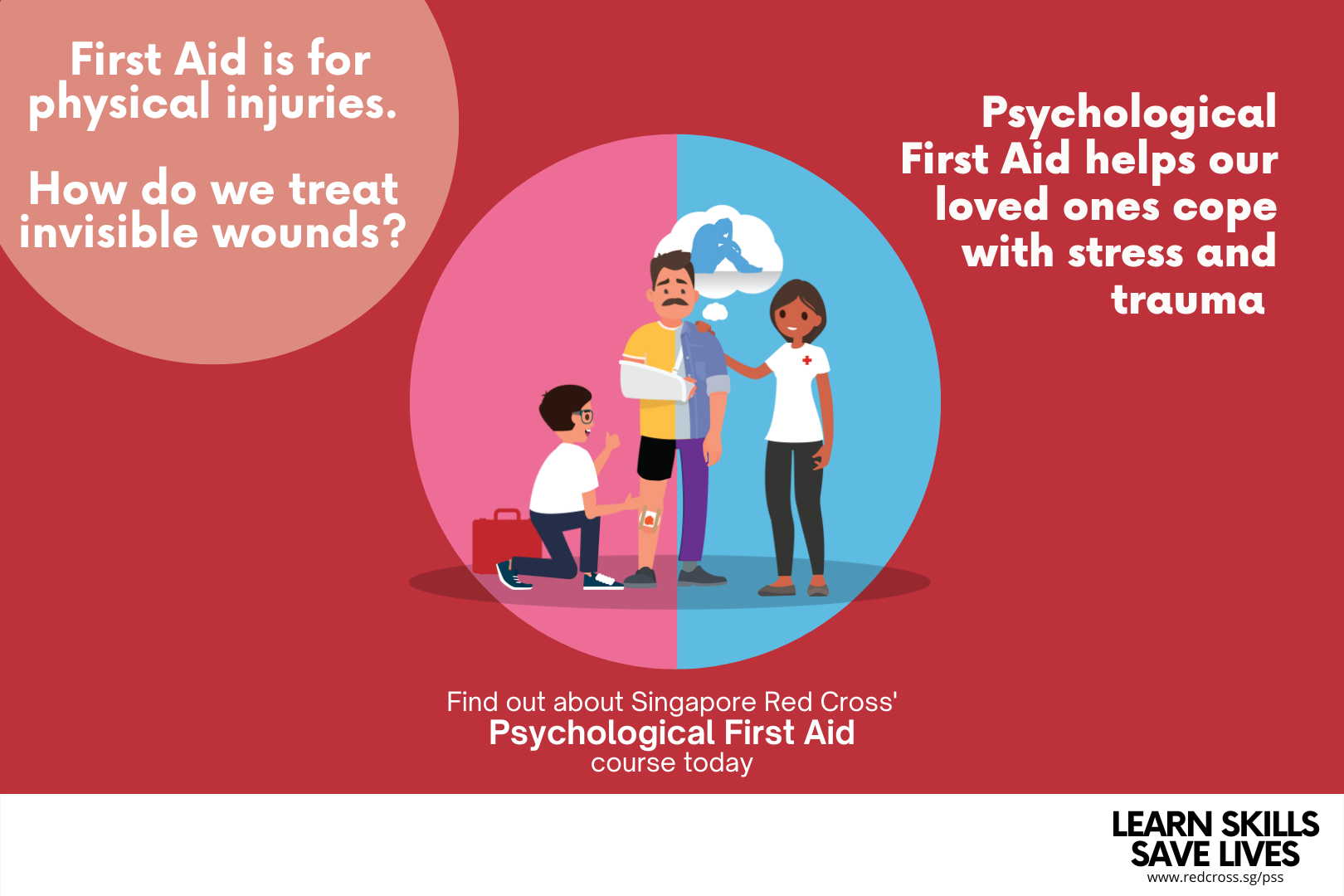
The uncertainties stoked by the COVID-19 pandemic, as well as the cascading effects of political and global challenges such as the war in Ukraine and climate change, call for greater adaptability amid a precarious and volatile landscape. The compounded impact of these circumstances may adversely impact one's mental, emotional and social well-being. As we commemorate World Mental Health Day on 10 October, Carmen Wong, Head of Singapore Red Cross Academy (SRCA)'s Centre of Psychosocial Support, shares the importance of mental well-being and the role that psychological first aid (PFA) plays in helping the affected people.
In alignment with the World Health Organization's theme of 'Making Mental Health and Well-Being for All a Global Priority', the International Federation of Red Cross and Red Crescent Societies (IFRC)'s Psychosocial Centre has adopted the theme, ‘Make Mental Health for All a Global Priority’ this year.
1. What are the top five mental health challenges in Singapore?
With one in seven Singaporeans experiencing a mental disorder in their lifetime, it is time to shed light on mental health, which had been stigmatised, and better understand the common mental conditions faced by Singaporeans. As of 2019, the top five mental health conditions among Singaporeans are depression, anxiety, schizophrenia, bipolar disorder and substance abuse1. In recent times, particularly in the early days of the COVID-19 pandemic, people had to contend with mental health challenges such as anxiety and depression. Sudden disruptions to their daily routine, from the loss of their livelihoods to switching to working from home, were contributing factors. We believe that these challenges are not given enough importance and are often neglected in society. Moreover, in recent times, the many viral videos of people acting violently have placed a stigma on mental health as well.
2. What are some of the mental health issues that people face?
Mental health is an integral component of health and well-being that underpins our individual and collective abilities to make decisions, build relationships and influence the way we function. Multiple social, psychological and biological factors can influence a person’s mental state at any point in time. If an individual experiences stress or crisis which is debilitating to their mental health, some common symptoms are: changes in mood, changes in the way they perceive things, obsessive and/or fearful thoughts and feelings of anxiety.
3. Why is mental health and wellness important?
Maintaining good mental health is crucial to promoting constructive behaviours, emotions and thoughts. The benefits of positive mental health can provide a higher quality of life. Besides building a positive self-image, one can develop a stronger ability to cope with life’s stressors, forge healthier relationships with loved ones and enhance productivity in day-to-day activities. An environment that respects and protects basic civil, political, socioeconomic and cultural rights is fundamental to mental health. According to the World Health Organization (WHO), poor mental health may adversely affect all areas of life, such as school or work performance, relationships with family and friends and the ability to participate in the community. The importance of mental well-being cannot be understated. When mental well-being is affected, it can stoke negative behaviours that may not only affect personal health but can also compromise relationships with others.
4. What is psychological first aid? Why is it important? How can it help the above-mentioned people?
Psychological first aid (PFA) is a technique for helping persons in distress to feel calm, regain control and feel supported when coping with their challenges. It enables someone to manage their situation and make informed decisions. The basis of PFA is caring about the person in distress. PFA is integral because it focuses on the immediate basic needs of the affected persons and, through a structured framework, provides adequate support that helps the person cope with the distress. Individuals experiencing mental health issues could benefit from PFA as it provides immediate emotional support, which could prevent the distress from escalating. It promotes natural resilience and psychological well-being.
5. What are the objectives of the Singapore Red Cross Academy (SRCA)?
SRCA aims to equip the masses with psychosocial support skills and knowledge to serve and promote resilience and mental wellness in communities.
6. Why should people learn PFA with SRCA? What are its benefits?
SRCA is the provider of bespoke PFA training, designed by a team of clinical psychologists from the International Federation of Red Cross (IFRC) and Red Crescent Societies’ Psychosocial Centre. The content is based on the WHO’s PFA framework and mental health guidelines. SRCA’s PFA is relevant to the local context, and the skills apply to everyday situations and crises.
7. What are the solutions to each of these health challenges? What can those affected to do help themselves and others?
PFA equips persons with basic knowledge of the importance of mental health and essential skills to support persons in distress. Through the provision of a listening ear and adoption of appropriate attending skills based on the WHO’s evidence-informed psychological first aid framework, PFA providers could offer emotional support to persons in distress in a structured manner. When people are more aware of the importance of seeking help and how to do so, they are better equipped to support themselves. This results in resilience while dispelling the stigma of help seeking.
1 - Statistics were obtained from Mental Health 101: All You Need to Know About Depression, Anxiety, Bipolar Disorder, Schizophrenia and More, and a study by the Institute of Mental Health
Copyedited by Michael Gutierrez, Volunteer
|
Get trained in psychological first aid and psychosocial support with the Singapore Red Cross Academy. |

